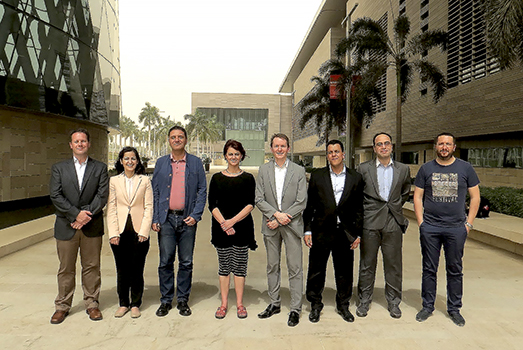The KAUST Frontiers of Sensor Science Symposium

The symposium’s organizing committee of young researchers from the United States and Arab region met at KAUST in early 2015.
“When we observe what KAUST is doing in the Middle East and in Saudi Arabia specifically, we see the University is a destination for high-quality science. We have top-level scientists, world-renowned faculty and cutting-edge facilities and capabilities,” said Jason P. Schrum, Ph.D., Integrative Lead at KAUST’s Office of Sponsored Research (OSR).
One of the fields in which KAUST focuses its research activity is sensor technology. From fundamental research, which is supported by OSR, to the more applied aspect of sensor technology in collaboration with Innovation and Economic Development (I&ED), KAUST scientists are highly active in sensor-related endeavors. KAUST senior leadership has set out a clear strategy for supporting this specific sector.
“We believe that there’s a lot of fertile ground and further collaborations to be had in the field of sensors. It’s very multidisciplinary,” said OSR Director, Teofilo A. Abrajano, Ph.D. When the opportunity presented itself for KAUST to host a Frontiers of Science symposium at the University in collaboration with the U.S.-based National Academy of Sciences (NAS), sensor technologies were an ideal topic on which to focus.
Founded in 1989, the Kavli Frontiers of Science symposia bring together outstanding early-career scientists who are typically 30-45 years of age to discuss topics on the cutting-edge of science. The concept has been internationalized with various editions outside of the U.S., with participants equally divided between emerging scientists and researchers from the United States other countries around Asia and the Middle East. It’s noteworthy that there are eight Nobel Prizes among the alumni of the Academy's Kavli Frontiers of Science symposia.
Leading up-and-coming researchers
Scheduled to take place in December at KAUST, the “U.S. National Academy of Sciences – KAUST Frontiers of Sensor Science Symposium” will represent the third year the Academy has partnered with an Arab-region country to host the symposium. The previous two Arab region Frontiers of Science symposia took place in Kuwait City, Kuwait and Muscat, Oman. The KAUST conference will be the first Frontiers symposium based in the Middle East to introduce a strategic thematic thrust across all scientific plenary sessions..
The topics will cover various aspects of sensor technologies, such as agriculture, biomedical applications, environment (smart cities) and materials science. Delivering the President’s Distinguished Keynote Address at the symposium will be Carlo Ratti, Director of MIT’s SENSEable City Lab, who will address how sensors and electronics relate to the environment in which we all live.
The 10-member organizing committee, in addition to two Chairs represented at KAUST and the U.S., selected speakers from a pool of highly qualified candidates that were nominated by the group itself. The early career scientists, which were selected in equal numbers from the U.S. and Arab countries, must be leaders in their field and have a stellar track record of achievement. Often they have recently completed a postdoctoral fellowship or are new faculty members with publications in high-impact journals and have won major awards and honors, such as the NSF CAREER award or a Howard Hughes Medical Institute Investigator. The committee has selected 24 speakers for the upcoming symposium at KAUST.
Apart from the selected speakers, promising scientists also applied to the Academy to participate and to present a poster. Participants also underwent a thorough vetting process to ensure their research met high standards of excellence and impact in their areas of sensor technology research. Finally, allocations have been made for observers to participate. As non-speakers who will also not present a research poster, the observers must still demonstrate how their research would benefit from attending the symposium.
Showing leadership in sensor research
The emerging importance of KAUST in the field of sensor technologies research is reflected in the support for the symposium provided by NAS, U.S. National Science Foundation (NSF) and the Office of Naval Research (Global Division).
“The fact that this topic is being recognized by major institutions in the U.S. and globally clearly speaks to the degree of interest and the potential impact of sensor technologies,” said Schrum.
There will be five plenary sessions during the symposium, each focusing on a given domain in sensing technologies. The first session will be led by Professor Slim Alouini, Associate Dean of KAUST’s CEMSE Division, and will examine processes and circuits in sensors. The second session will delve into materials science and the assembly of sensing units, while the third session will focus on biomedical applications of sensors, such as in early cancer detection and wearable sensors monitoring biometric data. The symposium will be opened by KAUST President Jean Lou Chameau, KACST President Turki bin Saud bin Mohammad Al Saud, and John Boright, Executive Director of International Affairs for the U.S. National Academies.
“We’ve chosen a wide range of topics because KAUST believes that a key frontier of sensor research is end-to-end integrative sensing. This means bringing the best in sensor research from materials, energy harvesting and storage, data communication and analysis, and application drivers together in designing sensors. It’s about generating sensor systems in accordance with what is needed ultimately in the field for specific applications,” said Abrajano.
-By Meres J. Weche, KAUST News.

